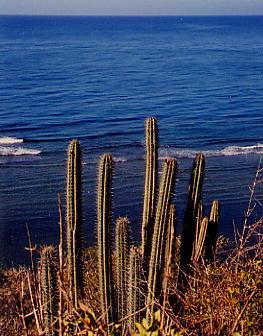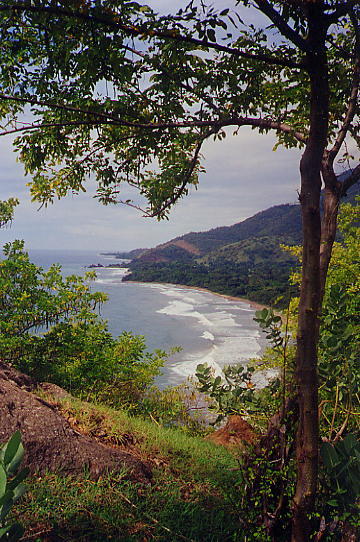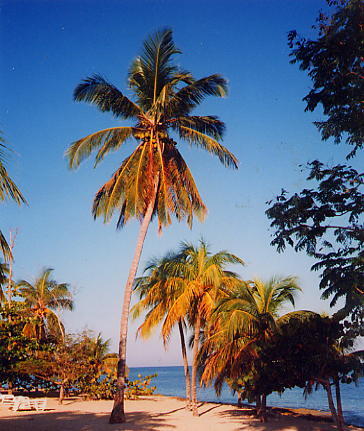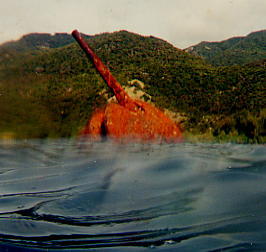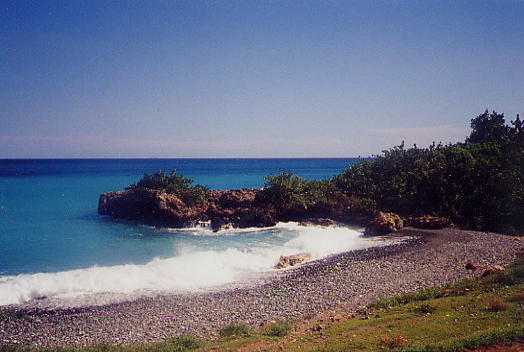Cuba - Beyond Belief
CUBA - BEYOND BELIEF
 Page updated June 29th, 2003 click here!!
THE FUTURE OF CUBA
Page updated June 29th, 2003 click here!!
THE FUTURE OF CUBA
Cuba is now in the position Japan and Germany were in at the end of the Second World War, which resulted in a complete rebuilding. This massive construction gave these two countries a brand new industrial base. All of Cuba's plants are obsolete and will have to be replaced if they are going to compete in the new world economy. Cuba has two choices to follow. Either they do it on their own and never catch up or they encourage offshore investment to bring them up to modern standards.
Today, Capital flows only to where it is stable and can show profit. For many years, Cuba was able to reap the benefits of the Cold War by being looked after by the Soviet bloc. Those days are gone, and no country is going to give or lend money to Cuba to see it evaporate. One of the largest pools of capital in the world is pension and retirement monies, and this money is only invested in safe places. To date, Cuba has not shown the world it can manage money in a satisfactory manner.
Cuba is now indebted to the western world to the amount of approximately US$12 billion and is not making payments or interest. They are, however, talking to their creditors about rescheduling. Although tourism has been a very bright part of the new economy, it will not bring Cuba in the 21st century as a world leader.
The main leaders in the Cuban Communist Party have been brought up in a controlled state and do not have market or free market experience. This is a very serious problem and the only solution I can see is that they will have to hire knowledgeable people on contract from a cross-section of fields and countries.
It is my feeling that Cuba has all the tools in education, motivation, and geographical position to be a world leader, but they need serious guidance and capital. Cuba cannot re-invent the wheel of a market economy, but with good guidance they may be able to invent a new bearing for the wheel. My advice to Cuba would be, "Those who try and teach themselves have a fool for a teacher and a fool for a student." My son, Sean, has a good sign on his bedroom door: "Never enough time to do it right, but always enough time to do it over." Let us all hope Cuba can do it right, but I must make one last statement. There are two types of people in this world: one signs the back of paychecks and one signs the front. Cuba needs more "front of the cheque signers."
THE NEW ECONOMY
I recently read an article, "Canada Must Shift to Business of Future," by Ms. Sherry Copper, Chief Economist and Executive Vice-President of the Bank of Montreal. Her detailed account of what has gone wrong in Canada can very well be applied to Cuba. Her feelings are that no-tech and low-tech jobs are going fast and new jobs will be in the knowledge-based industries.
Once Cuba gets into the new economy, this country could have the number one economy in the world. The reason for this is the high degree of education the younger generations of Cubans are now participating in. The new economy will bring jobs to Cuba that will require highly skilled workers who receive very good wages. This disposable income will be used to build and rebuild homes. This construction boom will last many years and provide employment for those who are not highly educated. In the future, I can see those who were employed cutting sugar cane being retrained into the construction trades. Fidel recently stated, " All of our youth want to be academics and no one wants to get into trades." Hand cutting sugar cane is very hard work and I am sure they would love to be replaced by machines harvesting and retrained in construction.
These are fields I feel could lead Cuba into the new economy:
Minerals: Cuba is very rich in nickel, cobalt, iron, copper, chromite, manganese, zinc, and tungsten. With new mining technology in processing, many new mines may come into production. Cuba does not have cheap power, so final refining will have to be done elsewhere.
Agriculture: Approximately 70% of Cuba is suitable for agriculture. Currently sugar cane and citrus trees take up most of the land. The Canadian company, Sherritt International, has a 200-hectare experimental farm near Varadero and is trying new crops. Sugar will always be part of the economy, but different crops must be developed. Vineyard, low-grade pulp trees, and hemp may help bring about new industries. The key to Cuba's agriculture will be genetic engineering to produce hybrid crops that can be grown in Cuba.
Aquaculture: Cuba has a very long coastline that is relatively pollution free. The European company, TiMarr, is now doing research with different fishes, crustaceans, and mollusks. Some of these marine stocks are being raised in temperatures that are substantially higher than the brood stock.
TiMarr has a great deal of capital committed for investment in Cuba and could shortly become one of Cuba's largest offshore investors.
Data Processing: Cuba is now constructing a brand new telephone system that is state of the art. This country in located midway between North and South America and right next door to the richest country in the world. The high educational standard that the youth of Cuba are now learning makes the country the number one choice for data processing. An example of this could be that MasterCard could use a Cuban system for all their data in and data out.
Pharmaceuticals: This country is very well positioned for the manufacture of different medicines and other drugs. It has been estimated that a number of North American drug companies are looking to set up major plants in Cuba.
Computers and Programming: This computer is certainly here to stay and the technology is going ahead at breakneck speed. Whether you consider the manufacture or the programming, the educated, dedicated, and quick-learning Cubans can be major partners in this field. Some programming companies are now operating in Havana with worldwide accounts.
High Tech Research: The Cuban education system is on high speed and the children spend a great deal of time in school and study. This puts them in direct competition with the children of Japan and the United States. With the proper training, I fee the Cuban children may develop skills that could make this island the top research and development area for the 21st Century.
Retirement: Cuba is very well suited to take advantage of the millions of baby boomers and war babies who are going to retire in the next 10 years. Both North America and Europe have many people who would love to be out of their homes during the bad weather winter months. This type of retirement could be high-rise or single homes and could create a major building boom in construction and appliance manufacturing. Retirement would also bring Cuba the most modern medical care to treat older persons as needed.
New Tech For Cuba: High tech is good but those who are employed in New tech are where the world is going. Cuba has only two choices in this area. Either they bring this type of business to Cuba as joint ventures with foreign corporations, or they send their young to work outside the country with the same corporations. I realize that this in not now possible with the United States, but some European countries are also very well positioned in the fields of NEW tech.
New Tourism: Recently the government of Cuba announced that all of their hotels and resorts would be sold to international corporations. I would expect Cuba to take a minority position and this would certainly release capital to finance other ventures. This also puts the marketing into the proper hands. Some holiday resort chains have a very strong loyalty. Some of the major players in Cuba today are Sol Melia - Spain, LTI - Germany, Super Clubs - Jamaica, Sandals - Jamaica, Club Med - France, RUI - Spain, and TRYP - Spain. Sol Melia from Spain recently stated that they shortly plan to manage over 25 hotels and resorts in Cuba.
At present, Cuba has 34 thousand hotel/resort rooms and plans are in the works to add 6 thousand more rooms each year. Leisure Canada of Vancouver, British Columbia, is planning to add 4 thousand resort and time-share rooms over the next 10 years.
At present, Cuba plans to have 7 million tourists by the year 2010. Tourism and retirement will certainly be part of Cuba's economy in the 21st century. The only potential problem I see here is the trend to cruise ship holidays.
Cruise Ships: There are many new cruise ships that are going to be delivered over the next four years. These new ships will add 30 thousand new staterooms and Cuba will be the "port of call" once the embargo is lifted. Cuba will not only be a "port visit", but many ships will use their facilities for stops and many Cubans will be employed on these ocean-going hotels. Cruise ships average one worker per stateroom, so a number of Cubans will be cruising as workers.
Port visits will also be very important for the economy. Each cruise ship passenger that visits Juneau, Alaska, leaves US$130 on land before they reboard the cruise ship.
The new capacity in the cruise industry will shortly see 10 million passengers in the Caribbean, and if properly handled, Cuba could very well be the number one winner in all aspects of the industry.
CURRENT AND FUTURE LEADERS
During the last Congress of the Communist Party of Cuba, new and younger Cubans were elected to both the Central Committee and to the Political Bureau. They also reduced the size of both of these. The Central Committee was reduced from 225 to 150 and the Political Bureau from 26 to 24. It is expected that these reductions will speed up the process of decision.
Dr. Fidel Alejando Castro Ruz: Fidel Castro is now in his 43rd year as the leader of Cuba. He holds numerous positions in the government, which includes President of the State Council, Prime Minister, First Secretary of the Party and Commander-in-Chief. He is a walking computer and can talk for hours on a variety of subjects. He has recently not been satisfied with the speed of Cuba's modernization. When he was asked recently about Cuba's economy, he stated that it was moving "like a turtle." He also states that he reads 150 newspapers a day!.
In the spring of 1999, he fired Roberto Robaina, the Minister of Foreign Affairs. He replaced him with Felipe Perez Roque, who is 35 years old. This certainly shows a trend to younger politicians and their policies.
Fidel recently sent the government of Russia 200 questions of where they went wrong in their transition to democracy. Fidel is now in his 49th year of being in military dress and this certainly must be a world record.
The Sixth Congress will have their meeting in the year 2003 and at that date Fidel will be 77. It is expected a new leader could be elected at this Congress, but until that time, "Fidel rules."
ARMY GENERAL RAÚL CASTRO RUZ: Raúl Castro is Fidel's younger brother, who was with Fidel when they started the M-26 revolution in 1953 and has always been beside Fidel. He is now the number two man in Cuba and is the Minister of National Defense. Raúl is not a good public speaker and most likely will not follow in Fidel's footsteps. Recently Raúl went to China to find out where they went wrong in their march to a market economy. Raúl is considered the number one man in Cuba when it comes down to day-to-day decisions.
RICARDO ALARCON DE QUESADA: Ricardo Alarcon is the President of the People's National Assembly and is the most worldly of all those in government. He was a member of the underground prior to the revolution and has been in government ever since. A good speaker in English, he could very well be Cuba's next leader..
Dr. CARLOS LAGE DAVILLA: Carlos Lage is Vice-President of the People's National Assembly and is responsible for the economy. Many of the new market changes in Cuba were his doing. Not always in Fidel's and Raúl's good books but always there when the rubber hits the road, he best understands how Cuba must evolve to be a leader in the 21st century. His guidance must be followed or else the new market revolution may fail.
FELIPE PEREZ ROQUE: Felipe is certainly of the new, younger generation, and is the Foreign Minister at the age of 35. He became a legislator at 21 and has been a member of the Central Committee since 1991. Felipe and Fidel are close friends and have very similar objectives.
HASSAN PEREZ: This young man is President of the University Students Federation. He has lately been seen with Fidel Castro and has read a number of Fidel's speeches when Fidel is not available. Perez could very well be extremely active in the next congress.
UPDATE AUGUST 2001
I recently returned to Cuba for my 25th research trip since 1993. There have been massive positive and negative changes during my eight straight years of studying Cuba.
On the positive side, there now is a reasonable supply of food in both state stores and private markets. Many Cubans now show signs of being overweight! New home construction can be seen in many areas of the country. I also noticed many more old and brand new autos on the road. Most young Cubans have modern American clothing and shoes. The US dollar stores are reasonably stocked, with very high prices compared to the peso wages rates. Those Cubans who have US dollar access from tourism, production bonuses, or from family off shore remittances are doing very well compared to their quality of life in 1993. Many young Cubans couples are starting families and there are many new Cubans under two years of age. This certainly shows confidence in the future by the younger generation.
Those that DO NOT have access to US dollars are NOT doing very well. The top peso wage in Cuba is 550 pesos a month (US $27) and is earned by a surgeon working in the best hospital in Havana. A retired widow receives 87 pesos a month (US $4.40). The US dollar economy is available to approximately 50% of the Cuban population. The main family remittances from the US go to the European community in Cuba. This is because the main groups of immigrants out of Cuba in the 1950-60’s were from the ‘European’ business owners, professionals and major landowners. This has left the Cubans with an African background in the peso economy.
These two class structures are expanding rapidly and is of serious concern. One of the major problems is household robberies. In many areas a house sitter must be hired if one is going to leave their home.
The price of imported oil is another major concern for all Cubans. It is now estimated that most of the tourism revenue is used to purchase oil. The majority of this oil is used to produce electrical power and interruptions are occurring more frequently.
The economic down turn in the North America is now affecting Europe and could very well put a halt to Cuba’s tourism expansion.
A large supply of Cuba’s tourist supply comes from Canada, Germany, Italy, Spain, and Great Britain. A contraction in tourists from these countries would have a serious effect on the Cuban economy. Cuba is now very dependent on the western world.
UPDATE MAY 2002
The horrific events of September 11th rocked the world and the drop in Tourism seriously affected Cuba’s revenue at all levels. The decline in worldwide tourism also reduced family remittances from Florida. The closure of the Russian Spy Center cost Cuba rent payments of around $200 million US dollars. Hurricane Michelle did about $750 million US dollars in damage.
The lack of US dollars in the Cuban economy resulted in an increase of all types of crime. Police security was strengthened and some pick-up discos were closed. The tourist count for 2001 was 1.7 million, which showed no increase from the previous year.
The recent increase in the price of oil will have a negative effect on Cuba’s deficit. Problems in Venezuela could seriously restrict the 53 thousand barrels of oil Cuba imports daily from this South American country.
The Dominican Republic is now giving Cuba a run for the mid range tourist and has a more friendly investment climate which offers: 21 golf courses, 40 private tour companies, private auto rentals and casino resort gambling.
Cuba’s new rules allowing a 180 day stay will help develop retirement and long-term adventure type tourism.
If Cuba were to allow vacation/retirement villas to be purchased by foreigners it would create a new industry.
Many Canadian tourists are now returning from their winter trips and are reporting the U.S. and Mexico to be expensive due to the low Canadian dollar. Those that are returning from “all inclusive” Cuban resorts are very pleased with the value that they have received.
The Cuban government is now starting to make the Internet available throughout Cuba. This will certainly make it easier for private casas to book guests. The 2 TV stations in Cuba now have English language instruction and the most popular show in Cuba is “Murder She Wrote” from the United States!
Former U.S. President Jimmy Carter will visit Cuba in May. The results of his visit will be interesting. The recent U.S. food sales to Cuba are also a good sign, especially since the food was delivered in U.S. owned ships.
Interbrew (Labatts) and Alcan have both signed long-term contracts with Cuba. Cuba must put a deposit on beer and soft drink containers since a serious litter problem is developing. A number of companies are now using Cuba for film productions and I feel this country in a short period of time become “Hollywood” southeast.
Donald Trump once said he wanted to build the best hotel in the world in Havana. Trump recently sold the Empire State Building!!
The American Society of Travel Agents (30,000 agents) is starting a training program for their members on how the Cuban tourism industry works.
I feel there could be some major changes in U.S. foreign policy after the mid term elections in November of this year.
![]()


